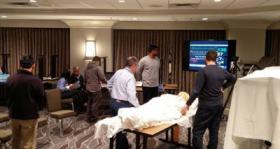
The University of Chicago Radiology Review
In addition to outlining diagnostic tips, techniques and pitfalls, this CME program will help you to better:
- Identify clinical features of common and uncommon diseases to create a differential diagnosis
- Integrate evidence-based techniques for performing electrodiagnostic tests into practice
- Define the role of novel imaging methods in reaching the correct diagnosis
- Evaluate the most effective imaging methods for different disease entities
- Appraise the strengths and limitations of diverse diagnostic imaging techniques
- Describe the impact of emerging technology and the growing healthcare system on the practice of radiology
- Confront challenging issues in the practice of radiology
Commercial Support: This CME certified activity has not requested or received any support or funding from commercial interests. This includes, but is not limited to, pharmaceutical companies and medical device manufacturers.
Target Audience
Learning Objectives
- Identify the clinical features of common and less common diseases to create an appropriate differential diagnoses;
- Discuss how both general and subspecialty radiologic imaging techniques lead to the appropriate differential diagnoses of common and less common diseases;
- Detail how the newer imaging methods of breast tomosynthesis, diffusion MR, tractography, cardiac CT/MR, virtual colonoscopy, PET/CT, SPECT/CT, and PET/MR can lead to improved diagnoses;
- Compare the most effective imaging methods of different disease entities;
- Analyze the strengths and limitations of different diagnostic imaging procedures;
- Describe how technology and the greater healthcare system affect the practice of radiology.
COURSE DIRECTOR
Disclosure Declarations
As a provider accredited by the ACCME, The University of Chicago Pritzker School of Medicine asks everyone who is in a position to control the content of an education activity to disclose all relevant financial relationships with any commercial interest. This includes any entity producing, marketing, re-selling, or distributing health care goods or services consumed by or used on patients. The ACCME defines “relevant financial relationships” as financial relationships in any amount occurring within the past 12 months, including financial relationships of a spouse or life partner that could create a conflict of interest. Mechanisms are in place to identify and resolve any potential conflict of interest prior to the start of the activity.
Additionally, The University of Chicago Pritzker School of Medicine requires authors to identify investigational products or off-label uses of products regulated by the US Food and Drug Administration, at first mention and where appropriate in the content.
The University of Chicago Pritzker School of Medicine is accredited by the Accreditation Council for Continuing Medical Education (ACCME) to provide continuing medical education for physicians.
Other Healthcare Professional Credit
Click here to view the activity or if you are logged in click on the "Complete Activity" button!

 Facebook
Facebook X
X LinkedIn
LinkedIn Forward
Forward